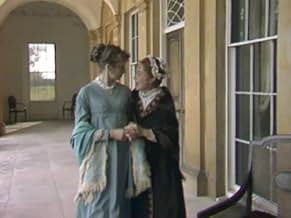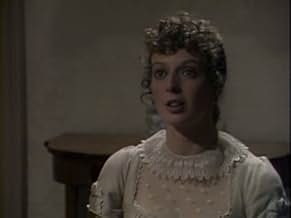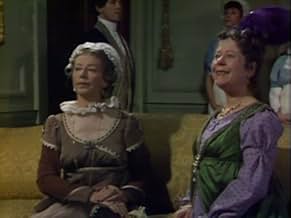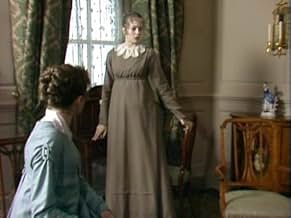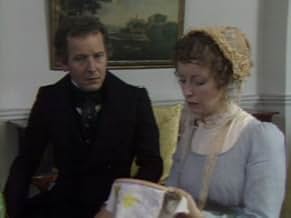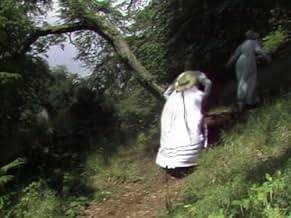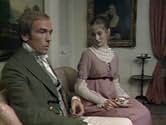IMDb-BEWERTUNG
6,7/10
1084
IHRE BEWERTUNG
Füge eine Handlung in deiner Sprache hinzuTwo sisters of opposing temperaments find love and some heartbreak in Jane Austen's 18th century classic.Two sisters of opposing temperaments find love and some heartbreak in Jane Austen's 18th century classic.Two sisters of opposing temperaments find love and some heartbreak in Jane Austen's 18th century classic.
Folgen durchsuchen
Empfohlene Bewertungen
This 3-hr miniseries seems to me much more faithful to the novel than the 1995 film by Ang Lee and Emma Thompson. the characters were as I pictured them while reading the novel. I find Edward a credible character and the love affair between him and Elinor skilfully and sensitively portrayed. (They make a much more convincing couple than stuttering Hugh Grant and Miss Thompson...) Best of all, the relationship between the two sisters : their tenderness and love in spite of their very different temperaments is convincingly depicted. I just felt the 1995 adaptation missed that aspect which made Elinor hysterics at ill Marianne's bedside all the more absurd and ill-timed. In this miniseries, there are no such hysterical scenes during Marianne's illness, Mrs Jennings is there just as in the book. The dialogues are almost word for word from the novel. The slow pace is suitable because so is the novel. Just one flaw : the end which seems a bit abrupt, as if they were running out of time. A really lovely series.
Well as a lover of Jane Austen one would be hard pressed to do a reproduction of one of her books and disappoint me. S&S was a pretty well done miniseries, most BBC miniseries are well done. There was a much more book and a more through representation of all the minor characters in this movie than in the 1995 Sense and Sensibility directed by Ang Lee and staring Kate Winslet, Emma Thompson. However the 1981 BBC miniseries was seriously lacking in a couple vital points, the omission of the youngest Dashwood daughter, Margaret and this viewer found the leads of Marranne and Elinor to be so abysmally portrayed I really didn't care a bit about what happened to their characters. These women weren't lovable or very likable. Overall, between to two leads, Tracey Childs as Marriann was the better portrayal. Irene Richard's portrayal of Elinor was so dead pan and empty of any emotion, at all, that much of the movie containing her was difficult to sit through. Over all, for the Austen fan this is a must see movie, but only for the more complete story and representations. Especially the devilishly catty Miss Lucy Steele who in the Ang Lee S&S is very under portrayed.
I have to disagree that the male performances were bland. Bosco Hogan did a very good job as the self-effacing Edward, and Douglas' portrayal of Sir John Middleton was so lively that as far as the interpretation of this character is concerned, the later S&S actor seems to have borrowed heavily from prior precedent. And Peter Woodward makes a dashing Willoughby, every bit as convincing as the more recent Willoughby. Woodward's voice and elocution are fantastic, and he sings remarkably well. I also enjoyed Marianne's performance in particular. In many ways, this adaptation is more faithful to the novel. The only flaw is that it begins in medias res rather than at the beginning, and it begins with a strangely stilted introduction, but that can be overlooked due to the brilliant performances, which improve with every minute of the film.
I am very surprised about some of the reviews for this. Fans are spoiled with Sense and Sensibility because it is one of the few period novels that has had an excellent big budget Hollywood production (the 1995 Ang Lee film). So anyone who has seen the film and then has come across this 1981 BBC TV adaptation will in comparison find this much less exciting I am sure. However, I watch many many older TV adaptations, I have watched much of the Dickens, Hardy, Bronte, Austen etc from 1970 onwards. And I can say with certainty that this is a really good version for its time. Sense and Sensibility was adapted 10 years earlier (1971) and that version is very low in budget and quality. I gave that one a 6/10. It is unusual for the BBC to remake it so relatively soon after but you can totally see why they wanted to do so. You can tell that they took everything that didn't work in the 1971 version and improved it to create a much better version. In this version the pacing is excellent, there is no filler and each scene logically and with explanation moves on to the next. The short 25 minute episodes also assist in keeping the momentum flowing. The casting is much better in this one, each of the characters are unique and identifiable and similar in age to the characters in the novel (unlike the 1995 film for instance). All of the characters connections to each other and motivations in any given scene are clear well presented. There are no hugely enduring actors in this one which is perhaps unusual but everyone does their job well. There is no doubt in my mind that Ang Lee saw this version and held it in high regard because the 1995 film feels like a movie remake of this version in many ways.
The advantage this television version has over the later 1995 film version directed by Ang Lee is that due to its length it allows more important scenes to be shown. This good BBC version keeps in the visit of Edward Ferrers to Barton Cottage and of Willoughby to see Marianne when she is ill. It also deletes the third sister Margaret, which I think is to the good.
It is important when doing Jane Austen not to over act, as suppression makes for tension, and in this the actors do a fine job. The scenes between Elinor Dashwood and Lucy Steele are excellent, seething and polite at the same time. Julia Chambers as Lucy Steele is excellent and equally as good as Imogen Stubbs in the 1995 film.
The male actors are not all bland, Donald Douglas gives a jolly performance and Peter Gale is perfectly unctuous as John Dashwood, but also sympathetic, caught as he is between a domineering wife and mother in law. Bosco Hogan and Robert Swann are a bit dull however.
This is not a sumptuous Hollywood version but fine on its own terms.
It is important when doing Jane Austen not to over act, as suppression makes for tension, and in this the actors do a fine job. The scenes between Elinor Dashwood and Lucy Steele are excellent, seething and polite at the same time. Julia Chambers as Lucy Steele is excellent and equally as good as Imogen Stubbs in the 1995 film.
The male actors are not all bland, Donald Douglas gives a jolly performance and Peter Gale is perfectly unctuous as John Dashwood, but also sympathetic, caught as he is between a domineering wife and mother in law. Bosco Hogan and Robert Swann are a bit dull however.
This is not a sumptuous Hollywood version but fine on its own terms.
Wusstest du schon
- WissenswertesFilmed in Devon over a particularly wet summer. Most of the scenes that take place in the rain were naturally occurring.
- PatzerThe fine mesh diffusing filter is very clearly visible in many exterior and interior scenes.
- Zitate
Marianne Dashwood: Elinor, where are your feelings?
Elinor Dashwood: I govern them.
- VerbindungenReferenced in What's Up Doc?: Folge #2.21 (1994)
- SoundtracksPiano Sonatina in G Major: II. Rondo - Allegro
Composed by Ludwig van Beethoven
Top-Auswahl
Melde dich zum Bewerten an und greife auf die Watchlist für personalisierte Empfehlungen zu.
- How many seasons does Sense and Sensibility have?Powered by Alexa
Details
- Erscheinungsdatum
- Herkunftsland
- Offizieller Standort
- Sprache
- Auch bekannt als
- Sense and Sensibility
- Drehorte
- Produktionsfirma
- Weitere beteiligte Unternehmen bei IMDbPro anzeigen
Zu dieser Seite beitragen
Bearbeitung vorschlagen oder fehlenden Inhalt hinzufügen


